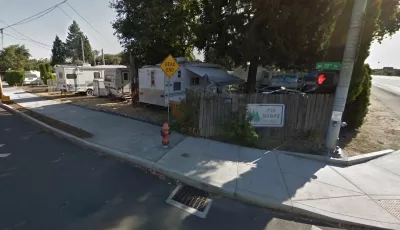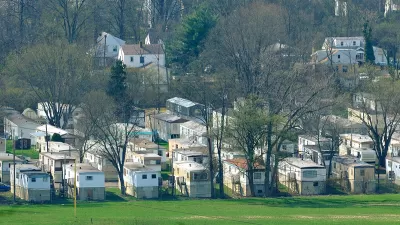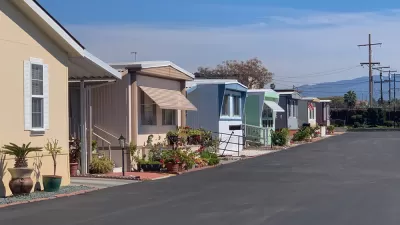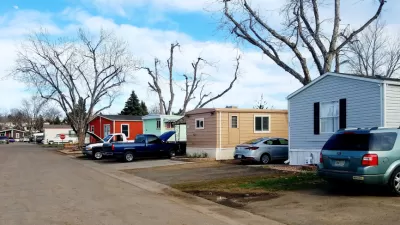The unique construction and ownership structure of so-called 'mobile' homes put their residents at increased risk of property damage, financial loss, and death during extreme weather events.

Examining the unique risks faced by manufactured home residents, Yessenia Funes writes that these structures "represent a particular level of vulnerability due to who usually lives in them and how and where they’re built." Manufactured homes (Funes calls out the misnomer "mobile homes", indicating that less than 20% of these homes ever move) face acute vulnerabilities when it comes to hurricanes.
"A number of factors makes this population vulnerable," writes Funes, including the social stigma of "trailer parks," the rampant poverty present in these communities, and language barriers. "For some families, recovery is never an option because while they own their homes, they rent the land their houses sit on. If the property owner of a mobile home park decides to close it or sell the land, residents are screwed," yet "[m]obile homeowners are ineligible for much of what [federal assistance] is available post-disaster." Yet "manufactured homes were not built to withstand hurricane-level winds and floods" until HUD mandated updated building standards "after Hurricane Andrew destroyed or damaged more than 10,000 manufactured homes in 1992."
"But things don’t have to be this way," says Funes. "Society should benefit from the affordability of these homes. Homeowners and their communities should benefit." Andrew Rumbach, the director of education at Texas A&M University’s Hazard Reduction and Recovery Center, says "[o]n the one hand, mobile homes and mobile home parks are a terrific source of affordable housing, and they provide a type of housing affordability level that we’re not providing through other types of housing development. They’re absolutely essential within our housing system, and yet they’re also very vulnerable to hurricanes. And that’s a really troubling issue from a life and safety perspective."
Funes argues that mobile home residents deserve more rights and "legislation that protects them and appreciates the role mobile homes play in the U.S. housing market."
FULL STORY: Mobile Homes and Hurricanes: The True Cost of ‘Affordable’ Housing

Alabama: Trump Terminates Settlements for Black Communities Harmed By Raw Sewage
Trump deemed the landmark civil rights agreement “illegal DEI and environmental justice policy.”

Planetizen Federal Action Tracker
A weekly monitor of how Trump’s orders and actions are impacting planners and planning in America.

The 120 Year Old Tiny Home Villages That Sheltered San Francisco’s Earthquake Refugees
More than a century ago, San Francisco mobilized to house thousands of residents displaced by the 1906 earthquake. Could their strategy offer a model for the present?

In Both Crashes and Crime, Public Transportation is Far Safer than Driving
Contrary to popular assumptions, public transportation has far lower crash and crime rates than automobile travel. For safer communities, improve and encourage transit travel.

Report: Zoning Reforms Should Complement Nashville’s Ambitious Transit Plan
Without reform, restrictive zoning codes will limit the impact of the city’s planned transit expansion and could exclude some of the residents who depend on transit the most.

Judge Orders Release of Frozen IRA, IIJA Funding
The decision is a victory for environmental groups who charged that freezing funds for critical infrastructure and disaster response programs caused “real and irreparable harm” to communities.
Urban Design for Planners 1: Software Tools
This six-course series explores essential urban design concepts using open source software and equips planners with the tools they need to participate fully in the urban design process.
Planning for Universal Design
Learn the tools for implementing Universal Design in planning regulations.
Clanton & Associates, Inc.
Jessamine County Fiscal Court
Institute for Housing and Urban Development Studies (IHS)
City of Grandview
Harvard GSD Executive Education
Toledo-Lucas County Plan Commissions
Salt Lake City
NYU Wagner Graduate School of Public Service





























